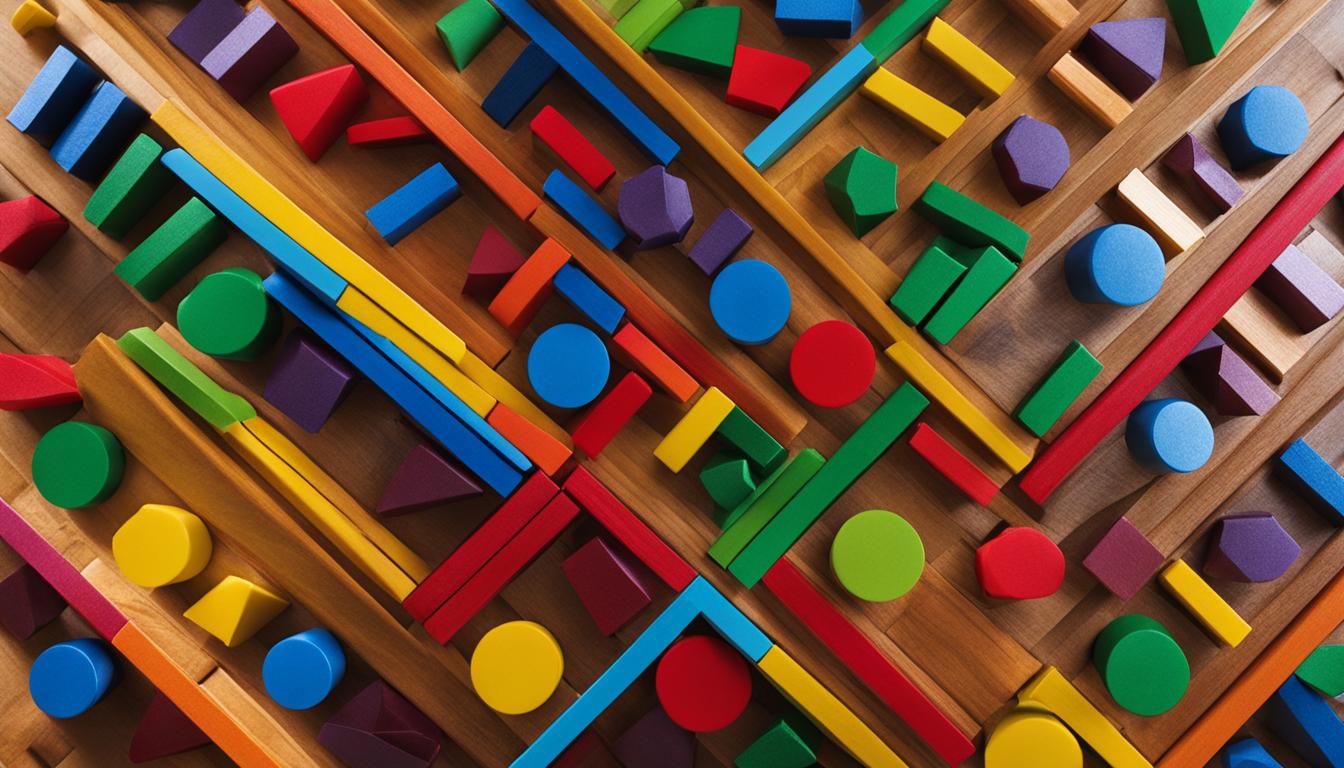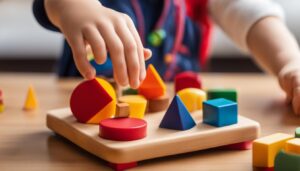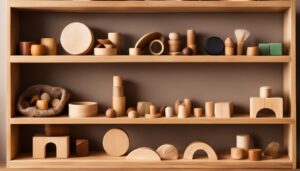Montessori math materials are a valuable tool for enhancing your child’s mathematical skills and understanding. These materials are specifically designed to support children’s learning and provide them with a hands-on, interactive approach to learning math. By incorporating Montessori math manipulatives into your child’s education, you can help them develop a solid foundation in mathematics and boost their confidence in problem-solving.
Montessori math materials are not only age-appropriate but also engage children in the learning process. These high-quality, durable materials promote independent learning and enable children to grasp important math concepts through experiential activities. Whether it’s using counting beads or number rods, these manipulatives provide a concrete representation of abstract mathematical ideas, helping children develop a deeper understanding of numbers, operations, and problem-solving strategies.
Key Takeaways:
- Montessori math materials enhance children’s mathematical skills through hands-on learning.
- These materials are age-appropriate and promote independent learning.
- Using Montessori math manipulatives can boost your child’s confidence in problem-solving.
- Montessori math materials provide concrete representations of abstract mathematical concepts.
- By incorporating these materials into your child’s education, you can foster a deeper understanding of numbers and operations.
Montessori Mathematics Curriculum: A Multisensory Approach
The Montessori mathematics curriculum takes a multisensory approach to teaching math. It incorporates a wide range of activities and materials that cater to different learning styles and abilities of children. This approach ensures that every child can engage with and understand mathematical concepts effectively.
The Montessori math curriculum introduces children to foundational math concepts such as counting, addition, subtraction, multiplication, and division. These concepts are taught through hands-on activities involving manipulatives like counting beads, number rods, and number cards. By using these manipulatives, children are able to experience concrete and visual representations of abstract mathematical ideas, which helps them develop a deep understanding of numbers and operations.
The curriculum also focuses on problem-solving strategies and critical thinking skills. Through interactive activities, children are encouraged to explore different strategies to solve math problems and develop their own problem-solving techniques. This approach promotes independent learning and fosters a love for mathematics.
Montessori Math Materials for Different Age Groups
Montessori math materials are specifically designed to cater to the needs and developmental stages of children at different age groups. These materials play a crucial role in introducing and reinforcing fundamental math concepts in preschoolers and elementary students. By incorporating Montessori math lessons and tools into their learning environment, children can effectively develop their math skills in a hands-on and engaging way.
Montessori Math Materials for Preschoolers
For preschoolers, Montessori math materials focus on teaching basic math skills such as number recognition, counting, and simple addition and subtraction. These materials provide a tangible and visual representation of numbers and quantities, making it easier for young children to grasp mathematical concepts. Some common Montessori math materials for preschoolers include:
- Abacus: A counting tool that helps children understand place value and perform basic calculations.
- Number beads: Colorful beads that can be manipulated to represent different numbers and quantities.
- Puzzles and board games: Fun activities that enhance number recognition and counting skills.
Montessori Math Materials for Elementary Students
As children progress into elementary school, Montessori math materials build upon the foundation laid in preschool and introduce more advanced concepts. These materials are designed to challenge students and promote critical thinking and problem-solving skills. Some examples of Montessori math materials for elementary students are:
- Place value materials: Tools that help students understand the relationship between digits and their position in a number.
- Fractional materials: Manipulatives that aid in visualizing and understanding fractions.
- Decimal materials: Resources that assist students in comprehending decimal numbers and their operations.
By utilizing these age-appropriate Montessori math materials, educators can provide a comprehensive math education that caters to the individual needs of each student. These materials engage children’s senses, promote independent thinking, and foster a deep understanding of mathematical concepts.
Table: Montessori Math Materials for Different Age Groups
| Age Group | Montessori Math Materials |
|---|---|
| Preschoolers | Abacus, Number beads, Puzzles and board games |
| Elementary Students | Place value materials, Fractional materials, Decimal materials |
Conclusion
Montessori math materials are valuable resources that can benefit children of all ages in their mathematical journey. These materials are carefully designed to be engaging, durable, and age-appropriate, enabling children to develop a strong foundation in math through hands-on activities.
Whether it’s introducing preschoolers to basic math skills or challenging elementary students with more advanced concepts, Montessori math materials offer a comprehensive and effective approach to teaching mathematics. By incorporating these materials into your child’s education, you can provide them with a multisensory and individualized learning experience that fosters a love for mathematics.
With a wide range of manipulatives, such as counting beads, number rods, and place value materials, Montessori math materials cater to different learning styles and abilities. They empower children to explore mathematical concepts independently, boosting their confidence and problem-solving skills.
By embracing Montessori math materials, you can empower your child to become a proficient mathematician, equipped with a deep understanding of mathematical concepts. So, whether your child is just starting their math journey or looking to strengthen their skills, Montessori math materials are a valuable investment in their academic growth.




